Lea Wait's Blog, page 63
May 26, 2023
Weekend Update: May 27-28, 2023
Next week at Maine Crime Writers there will be posts by Kait Carson (Monday), special guest Kathryn Laskey (Tuesday), Kaitlyn Dunnett/Kathy Lynn Emerson (Thursday), and Kate Flora (Friday).
In the news department, here’s what’s happening with some of us who blog regularly at Maine Crime Writers:
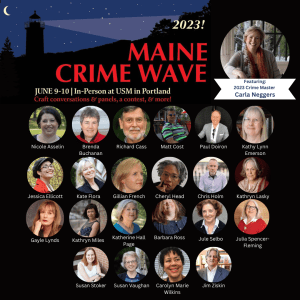
Coming soon (June 9-10): Maine Crime Wave! Lots of Maine Crime Writers will be there. Registration is now open. For more information, click here:
https://www.mainewriters.org/maine-crime-wave
Kate Flora is celebrating the publication of her stand-alone domestic suspense novel, Teach Her a Lesson from Encircle Publications.
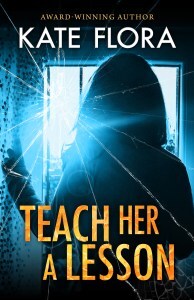
Here’s a cool interview with Kate on Lisa Haselton’s blog: https://lisahaselton.com/2023/05/25/interview-with-award-winning-mystery-author-kate-flora/
And in case you’ve missed it, here’s the trailer for the book:
https://drive.google.com/drive/folders/1a0uTlJ3KSy0_7dpOyD4YnWdqlAjQKdVX
Here are MCW writers Dick Cass and Jule Selbo, and alum Barbara Ross doing a “Making a Mystery” event at the Maine Library Conference.

Interested in doing a pre-pub review for a collection of stories featuring the authors’ series characters? Apply for a review copy here: https://storyoriginapp.com/reviewcopies/808026cc-f036-11ed-a5fc-131a2c071954
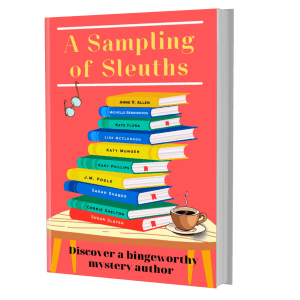
An invitation to readers of this blog: Do you have news relating to Maine, Crime, or Writing? We’d love to hear from you. Just comment below to share.
And a reminder: If your library, school, or organization is looking for a speaker, we are often available to talk about the writing process, research, where we get our ideas, and other mysteries of the business, along with the very popular “Making a Mystery” with audience participation, and “Casting Call: How We Staff Our Mysteries.” We also do programs on Zoom. Contact Kate Flora
A Picture is Worth a Thousand Words by Matt Cost
A picture is worth a thousand words, or is it? That is the question.
When selling a book, most experts will agree that there are three important components to getting a stranger in the wild to decide that they want to open their wallet or purse to take your cherished work home with them.
The TitleThe Book CoverThe DescriptionFor my historical novels, I’ve tried to give a clear and concise indicator as to the content of the book in the title. I wanted to make sure that the reader clearly understood what they were getting into. (Even if many critics commented that I didn’t mention that Fidel Castro became a hated despot after the conclusion of my Cuban Revolution book.) These books allowed my cover illustrator at Encircle Publications, Deirdre Wait, a high level of creativity to convey to the potential reader what the novel is about.
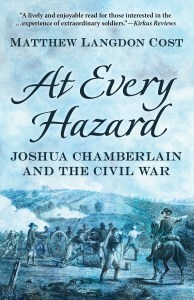
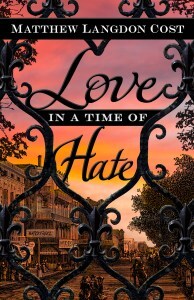
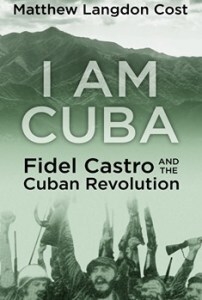
The beginning of my Mainely Mystery series added a needed dimension to the title and the cover art. Mainely has worked out well for me. You can throw Mainely in front of just about anything and it will be immediately found on search engines without being diluted by a multitude of other titles. Power. Fear. Money. Angst. Wicked.
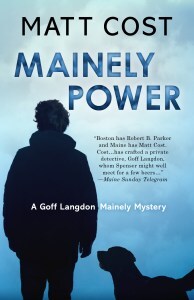
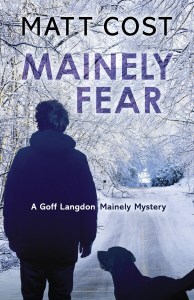

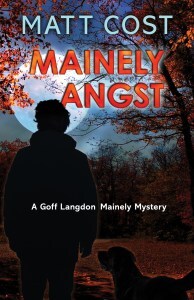
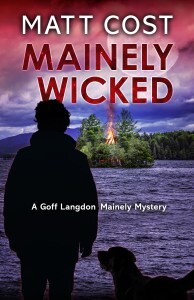
Because the Mainely Mysteries are a series, Deirdre Wait determined it was important to brand the cover art. Having a familiar imagery to the cover that links all of the books together, in this case, a shadowy silhouette Langdon and his canine companion. Then subtle addition to give each title uniqueness. Frozen Maine scene. Downtown Brunswick. A full moon. A bonfire on an island.
The Clay Wolfe Trap series has been more difficult in the title. It seems that many titles end in Trap and it is easy to get lost in the shuffle. Cosmic Trap was originally going to be Honey Trap, but it seems there are tons of books with that name, and most of the covers include half-clothed people. In this series, I have needed unique first words. Wolfe. Mind. Mouse. Cosmic. Pirate. Even if searching Amazon for Mouse Trap still initially goes to… mouse traps.
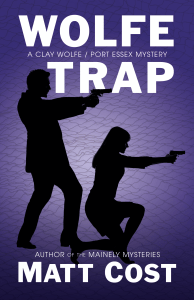

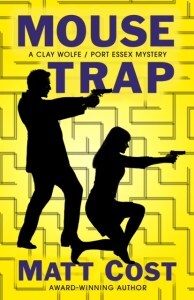
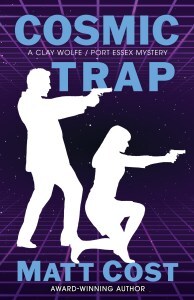
Deirdre Wait has used a similar branding mechanism for this series. In this case, it is Clay Wolfe and his partner, Baylee Baker, in silhouette, pointing guns in a James Bond sort of look. The backgrounds have been more design oriented to fit the bill of traps.
I look forward to seeing what will happen with my Brooklyn 8 Ballo series. The first one is Velma Gone Awry. Coming next April will be City Gone Askew. It will be interesting to see after that if I am able to continue to brand the titles in similar ways. And of course, I am fascinated to see what the cover artist, Deirdre Wait, for the publisher, Encircle Publications, comes up with to brand and make unique the faces of these books.

Do I think that a picture is worth a thousand words? Not at all. As a writer, I fully believe in the power and impact that can be packed into a thousand words, much less eighty-five thousand words. But to each their own, and a cover is going to grasp the attention of a potential reader much quicker than my thousand words ever would. Thank you to Deirdre Wait for so many fantastic covers to give face to my books.
What is it that you all find important in a title, a cover, and back cover copy?
Write on.

About the Author
Matt Cost was a history major at Trinity College. He owned a mystery bookstore, a video store, and a gym, before serving a ten-year sentence as a junior high school teacher. In 2014 he was released and began writing. And that’s what he does. He writes histories and mysteries.
Cost has published four books in the Mainely Mystery series, with the fifth, Mainely Wicked, due out in August of 2023. He has also published four books in the Clay Wolfe Trap series, with the fifth, Pirate Trap, due out in December of 2023.
For historical novels, Cost has published At Every Hazard and its sequel, Love in a Time of Hate, as well as I am Cuba. In April of 2023, Cost combined his love of histories and mysteries into a historical PI mystery set in 1923 Brooklyn, Velma Gone Awry.
Cost now lives in Brunswick, Maine, with his wife, Harper. There are four grown children: Brittany, Pearson, Miranda, and Ryan. A chocolate Lab and a basset hound round out the mix. He now spends his days at the computer, writing.
May 25, 2023
Pandemic Perspectives
Today, we are delighted to welcome Katherine Hall Page back to blog to talk about her new book, and writing during the pandemic.
Katherine Hall Page: My new book, The Body in the Web is not about being in Maine. 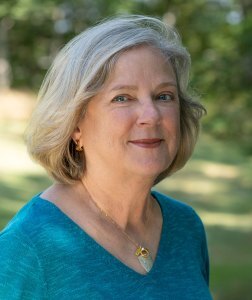 It’s about not being in Maine. When we closed up on the Point in October 2019, the idea that we wouldn’t be opening up as usual Memorial Day weekend was as far from our minds as many, many other things would turn out to be. Like my series sleuth Faith Fairchild, who also lives in Massachusetts, there were travel restrictions in place. We could go to Deer Isle but coming back meant quarantining. Never have I blessed technology so much as it allowed me to keep in touch with people. Yet, a long distance love affair is heart-breaking, although it can also be heart-affirming. I was soon treasuring times over sixty-three years spent there, recalling people, adventures, misadventures, landscapes of course and books, going way back to Louise Dickinson Rich’s We Took to the Woods up to all the Crime Writers here plus Joe Coomer and Richard Russo. I pulled the Robert McCloskeys from the shelf and thought about Burt Dow, buried in the same cemetery as my parents. I read Millay’s Renascence aloud and imagined myself looking out across the water toward the Island from the top of Mount Battie. It was a way of coping with the fears, and deprivations of the pandemic.
It’s about not being in Maine. When we closed up on the Point in October 2019, the idea that we wouldn’t be opening up as usual Memorial Day weekend was as far from our minds as many, many other things would turn out to be. Like my series sleuth Faith Fairchild, who also lives in Massachusetts, there were travel restrictions in place. We could go to Deer Isle but coming back meant quarantining. Never have I blessed technology so much as it allowed me to keep in touch with people. Yet, a long distance love affair is heart-breaking, although it can also be heart-affirming. I was soon treasuring times over sixty-three years spent there, recalling people, adventures, misadventures, landscapes of course and books, going way back to Louise Dickinson Rich’s We Took to the Woods up to all the Crime Writers here plus Joe Coomer and Richard Russo. I pulled the Robert McCloskeys from the shelf and thought about Burt Dow, buried in the same cemetery as my parents. I read Millay’s Renascence aloud and imagined myself looking out across the water toward the Island from the top of Mount Battie. It was a way of coping with the fears, and deprivations of the pandemic.
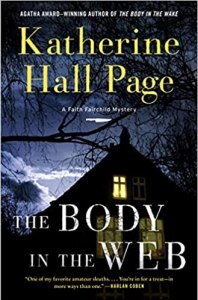 The Body in the Web (the title refers both to spiders and the worldwide one), begins on January 24, 2021, and ends in May 2022. Here are the first sentences:
The Body in the Web (the title refers both to spiders and the worldwide one), begins on January 24, 2021, and ends in May 2022. Here are the first sentences:
“Faith Fairchild set her phone down with the first sigh of relief she had felt for almost eight months…Such was the effect of the call from her husband Tom, the Reverend Thomas Fairchild, with the stunning news that as one of the local VA hospital’s chaplains he was eligible for vaccination and was on his way to get the shot. A simple sentence, a series of words turned the room from the everyday to a rare setting she would always remember as the beginning flicker of hope.”
After what we had all been through starting in late 2020, knowing that the book would look back (my favorite lawn sign from the time was a homemade one I saw, “2020 Make It Stop!”), I wanted to begin with an expression of that hope. Faith Fairchild and family have formed a Pod with son Ben home from college, daughter Amy a senior in high school and husband Tom, all dealing with their lives remotely. Faith’s catering business is suspended. When a close friend’s death is deemed a suicide, Faith must solve what she knows is a murder remotely as well. She can’t go knock on doors, face suspects eye-to-eye. It became a challenge to unmask while masked!
I kept a daily journal starting in March 2020 during the pandemic, jotting down a few sentences about things happening in our lives and outside the Pod (three—our son under the same roof happily) ‚ what we ate and how I “foraged” for essentials. Once it was safe to be with people and I started the book, everyone had stories to tell—some tragic, but also many about their ways of managing, ingenious, even humorous. Similar to one of the subplots in the book, I learned about a postponed very elaborate wedding, and plan for a honeymoon baby prompting thorny discussions since no one could pick a new date, for either. Biological clock ticking, baby first? I detailed other issues. Unlike paper goods, there were many shortages, that could not have been predicted— thread since we were all stitching up masks, cream cheese! and the search for yeast alternatives. I’m still making Beer Bread, with all sorts of variations—adding cheese, spices.
I spoke to teachers I know about the difficulty of teaching remotely, particularly when it came to art and music. They are now dealing with how much students lost during the time in isolation, not just academic skills, but social skills. Adults also lost the social ones as I was reminded last summer at an in-person gathering when two different people told me they were having trouble making conversation, small talk, or about larger issues. “I got out of the habit,” one said.
We are still talking about Covid and the Pandemic. And always will, dating things from before, during and after as we did during other devastating times—the assassinations of Martin Luther King Jr, the Kennedys, and 9/11. We’ll be living with Covid from now on, getting boosters and telling stories to each other, eventually to those younger who didn’t experience it. It is embedded in our institutional memories forever.
There is one memory that will always be a joyful one— the moment after the long, and very familiar, drive north, finally crossing the 1,088-foot bridge spanning Eggemoggin Reach to Deer Isle! We’d made it safe and sound!

Katherine Hall Page is the award-winning writer of the Faith Fairchild series (Wm Morrow/Avon), a recipient of the Agatha for Best First, Best Short Story, and Best Mystery Novel as well as other Agatha, Edgar, Mary Higgins Clark, and Maine Literary Awards nominees. She received Malice Domestic’s Lifetime Achievement Award and another—Crime Master—from the Maine Writers and Publishers Alliance. The Body in the Web is the 26th in the series. She has also published a cookbook, Have Faith in your Kitchen, and books for YAs and Middle Grade readers. A New Jersey native, she lives in Massachusetts and Maine (part of every year since 1858!). www.webmaster@katherine-hall-page.org
May 24, 2023
Twelve Years in the Making, Teach Her a Lesson Finally Arrives!
Infatuation, threats, and lies are all on the menu in this thriller from Kate Flora. When high school teacher Alexis Jordan becomes the focus of a disturbed teen things quickly spiral out of control. And as the danger intensifies Alexis learns that not all of her friends are allies. With more twists and turns than a mountain highway, Teach Her a Lesson will keep you turning pages late into the night. — Bruce Robert Coffin, award-winning author of the Detective Byron mysteries
Kate Flora: I confess: I am practically dancing in the street I am so happy that Encircle Publications loved the book as much as I do. It has been a long journey to publication. I wish I’d kept better track of the many iterations of this book. Probably they would fill a filing cabinet. It used to be much longer. It used to have another voice character, a sleazy reporter. It has probably been more than twelve years. Over those years, I’ve hired two different editors to help me, editors who wanted to take the book in two very different directions. During those rewrites, trying to respond to their advice, I’ve sometimes felt like I was being pulled in opposite directions. I had to give myself the advice I give other writers: consider the advice but never lose sight of your own intentions for the book.
Publications loved the book as much as I do. It has been a long journey to publication. I wish I’d kept better track of the many iterations of this book. Probably they would fill a filing cabinet. It used to be much longer. It used to have another voice character, a sleazy reporter. It has probably been more than twelve years. Over those years, I’ve hired two different editors to help me, editors who wanted to take the book in two very different directions. During those rewrites, trying to respond to their advice, I’ve sometimes felt like I was being pulled in opposite directions. I had to give myself the advice I give other writers: consider the advice but never lose sight of your own intentions for the book.
As the book description says, this is a story that feels pulled from the headlines. A dedicated young teacher willing to give her all for her students is stunned when she’s propositioned by a student she is coaching for his role in a school play. She has no way of knowing that he’s been obsessing about her for months. He’s been studying her, invading her home when she’s not there, building an entire fantasy in which she reciprocates his passion.When she rejects his repeated advances, moving from gentle and polite to firm and angry, he sets out to destroy her. Suddenly, her marriage, her job, and possibly her freedom are at risk when he takes his story to the school administration and then to the police. Abandoned by her husband, frightened, judged, and isolated, she realizes that her student is dangerous. Unable to have what he wants, he will stop at nothing to get revenge. But no one will believe her.
We writers are frequently asked: Where do you get your ideas? I often say from the newspaper. My first Thea Kozak mystery was inspired by an Ann Landers column. This book started when I read a bunch of stories about teachers seducing their students, and I asked: What if it’s the student who is the bad actor? Some early readers found it implausible that a sixteen-year-old boy could possibly be such a schemer. I disagreed. The downside of snowplowing a child’s way through life and giving the message that they should be able to have what they want can be very dangerous. In this story, as you will learn, the boy has a long history of terrible acts, a history which vanishes whenever his protective mother moves him to a new town.
I’m excited to share this book trailer, which I think captures the tension of the book very well. https://drive.google.com/drive/folders/1a0uTlJ3KSy0_7dpOyD4YnWdqlAjQKdVX
Here’s the buying link: https://amzn.to/3MUvmXL
May 19, 2023
Weekend Update: May 20-21, 2023
 Next week at Maine Crime Writers there will be posts by Charlene D’Avanzo (Monday), Maureen Milliken (Tuesday), Kate Flora Book Birthday (Wednesday) Katherine Hall Page guest post (Thursday), and Matt Cost (Friday).
Next week at Maine Crime Writers there will be posts by Charlene D’Avanzo (Monday), Maureen Milliken (Tuesday), Kate Flora Book Birthday (Wednesday) Katherine Hall Page guest post (Thursday), and Matt Cost (Friday).
In the news department, here’s what’s happening with some of us who blog regularly at Maine Crime Writers:
Coming soon (June 9-10): Maine Crime Wave! Lots of Maine Crime Writers will be there. Registration is now open. For more information, click here:
https://www.mainewriters.org/maine-crime-wave

Save the Date! Maine Crime Writers Dick Cass, Matt Cost, John Clark, Kate Flora and Maureen Milliken will be at the Belgrade Lakes Village Green Craft Fair from 9 a.m. to 2 p.m., Sunday, June 25, in a fundraiser for the Friends of the Belgrade Public Library. Stop by to say hi, check out our books, and enjoy the beautiful Lakes Region and an excellent craft fair.
An invitation to readers of this blog: Do you have news relating to Maine, Crime, or Writing? We’d love to hear from you. Just comment below to share.
And a reminder: If your library, school, or organization is looking for a speaker, we are often available to talk about the writing process, research, where we get our ideas, and other mysteries of the business, along with the very popular “Making a Mystery” with audience participation, and “Casting Call: How We Staff Our Mysteries.” We also do programs on Zoom. Contact Kate Flora
May 18, 2023
Is It “That” Time Yet?
I was listening to NPR the other day, an interview with Judy Blume, who is much in the news lately for several reasons.  A movie has been made of Are You There God? It’s Me, Margaret. In conjunction with that, a documentary of her life, Judy Blume Forever, is forthcoming, as well as adaptations of a couple of her other novels. But the most notable bit of the interview for me was when she confessed that, at 84, she was unlikely to write another novel. ”I’m an extrovert,” she said. “I like people. I don’t want to coop myself up any more.”
A movie has been made of Are You There God? It’s Me, Margaret. In conjunction with that, a documentary of her life, Judy Blume Forever, is forthcoming, as well as adaptations of a couple of her other novels. But the most notable bit of the interview for me was when she confessed that, at 84, she was unlikely to write another novel. ”I’m an extrovert,” she said. “I like people. I don’t want to coop myself up any more.”
At the same time, I’ve been reading Don Winslow’s gangster trilogy, the first two of which, City on Fire and City of Dreams, are out now, with the third and final book due next year. He, too, has publicly announced he’s not writing any more novels. If you’re active on Twitter, you’ve seen him become more and more politically minded, to the extent that he is putting all his energies into activism and political commentary.
And, more worrisome to me, I heard Dennis Lehane say in an interview that he didn’t know if he was going to write more novels, though his new release Small Mercies, is by all accounts an example of him at his best.  He did say he would write another if something grabbed him the way this book did, but the notion of quitting?
He did say he would write another if something grabbed him the way this book did, but the notion of quitting?
I spent most of my working life shoehorning my writing in and around a challenging career and family. I write every day and have done for forty-some years. Before I’d heard these people talk about it, I would have said you’d have to pry my pen (keyboard) from my cold dead fingers to make me quit. I didn’t know you could do that.
And yet—age brings a growing awareness of the limited nature of time—my time. All the things I planned to do and haven’t done, the people I’ve sworn to spend time with and haven’t, the other modes of building and creating that attract me. And trout fishing . . .
So maybe at one level I can understand the impulse to step away from a work that is difficult, unheralded for the most part, a work that no one much cares whether you’re doing it, a work without much in the way of tangible recompense. Very few of us are going to make even a small fortune at this, very few of us are going to see much acclaim. It is a temptation, I think, to throw up one’s hands and say Fuck It .
.
On the other hand—all three of the writers I mentioned have had their work heard, have tasted success in the way the world defines it. Is it easier to give up what you’ve had? In most of our cases, it would be more of a discard of hope.
Then I think of Robert Parker,  who literally died at his desk, John Updike revising poems while he was dying of lung cancer. Maybe there is a spark there that cannot give up the ghost.
who literally died at his desk, John Updike revising poems while he was dying of lung cancer. Maybe there is a spark there that cannot give up the ghost.
It’s a conundrum. I love my chicken-scratching, ticky-tacky keyboard tapping too much at the moment to give it up. And I’ve gone without much acclamation for long enough it doesn’t bother me particularly to know I’m unlikely to see the success a Winslow or a Parker saw.
It is the work. Still and now. A former teacher, afflicted with lung cancer, used his limited time to write a memoir of his dying. I have no answers, other than to know that it’s not time to quit yet. Like the urge to write, the urge to quit is personal. And I hope that if I ever do give it up, I’ll be able to do that with the grace of a Judy Blume. It is all any of us wants, I think. The grace to know our own minds.
May 17, 2023
Advice from ‘Butt In The Chair’ Experts
Sandra Neily Here;
I needed someone wise in my ear this month and a few words of inspiration. Found some!


From Joe Fassler’s interviewing 150 writers:
First Sentence
“The first line must convince me that it somehow embodies the entire unwritten text,” William Gibson said. Stephen King described spending “weeks and months and even years” working on first sentences, each one an incantation with the power to unlock the finished book. And Michael Chabon said that, once he stumbled on the first sentence of Wonder Boys, the rest of the novel was almost like taking dictation. “The seed of the novel—who would tell the story and what it would be about—was in that first sentence, and it just arrived,” he said.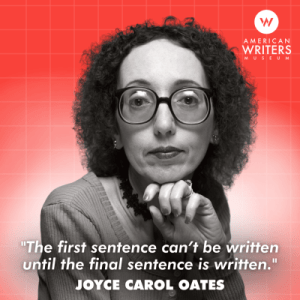
Sound It Out .
“Plot can be overrated. What I strive for more is rhythm,” the late Jim Harrison said. “It’s like taking dictation, when you’re really attuned to the rhythm of that voice.” George Saunders described a similar process, explaining that sound shows him where the energy is, revealing which aspects of the story are important, which lines to follow. It can help with revision, too. “Sound gives us clues about what is necessary and real,” he said. “When you read [your work] aloud, there are parts you might skip over—you find yourself not wanting to speak them. Those are the weak parts. It’s hard to find them otherwise, just reading along.”
 Stubborn Gladness
Stubborn Gladness
Elizabeth Gilbert’s concept of “stubborn gladness,” a term she borrows from the poet Jack Gilbert. It’s a promise to take things in stride, to remain cheerfully engaged no matter how difficult things get. “My path as a writer became much more smooth,” she said, “when I learned, when things aren’t going well, to regard my struggles as curious, not tragic.”
******
From tips from Nobel Prize winners:
“The Canadian author Alice Munro, who was given the Nobel for Literature in 2013: ‘Usually, I have a lot of acquaintance with the story before I start writing it. When I didn’t have regular time to give to writing, stories would just be working in my head for so long that when I started to write I was deep into them … add to this, you could keep a voice recorder or use the voice note function on a smartphone to record ideas or sentences for your novel as they occur to you. This will help you keep creating even when you have fewer moments to sit down and write.’
The Colombian author Gabriel Garcia Marquez received the Nobel Prize for Literature in 1982. The celebrated author of novels such as Cien años de soledad (translated as A Hundred Years of Solitude) was also a journalist. ‘In journalism just one fact that is false prejudices the entire work. In contrast, in fiction one single fact that is true gives legitimacy to the entire work. A novelist can do anything he wants so long as he makes people believe in it.’
The Peruvian author Mario Vargas Llosa, who published over 30 novels, plays and essays, received the Nobel in 2010. ‘If I started to wait for moments of inspiration, I would never finish a book. Inspiration for me comes from a regular effort.’
The great Canadian-American author Saul Bellow, who published 14 novels and novellas and won the Nobel for writing in 1976, beautifully described the intimacy between the writer and the reader: ‘When you open a novel — and I mean of course the real thing — you enter into a state of intimacy with its writer. You hear a voice or, more significantly, an individual tone under the words … It is more musical than verbal, and it is the characteristic signature of a person, of a soul. Such a writer has power over distraction and fragmentation, and out of distressing unrest, even from the edge of chaos, he [or she] can bring unity and carry us into a state of intransitive attention. People hunger for this.’ ”
******
More Wisdom….
“I write entirely to find out what I’m thinking, what I’m looking at, what I see and what it means. What I want and what I fear.”—Joan Didion
“Instructions for living a life:
pay attention
be astonished
tell about it” —Mary Oliver
“Your day’s work might turn out to have been a mess. So what? Vonnegut said, ‘When I write I feel like an armless legless man with a crayon in his mouth.’ So go ahead and make big scrawls and mistakes. Use lots of paper. Perfectionism is a mean, frozen form of idealism, while messes are the artist’s true friends.” —Anne Lamott
“Do not hoard what seems good for a later place in the book, or for another book; give it, give it all, give it now.” —Annie Dillard

And From Stephen King:
“2nd draft = 1st draft – 10%” Every story and novel is collapsible to some degree. If you can’t get out ten per cent of it while retaining the basic story and flavor, you’re not trying very hard.”
“Stopping a piece of work just because it’s hard, either emotionally or imaginatively, is a bad idea. Sometimes you have to go on when you don’t feel like it, and sometimes you’re doing good work when it feels like all you’re managing is to shovel shit from a sitting position.”
“There is no Idea Dump, no Story Central, no Island of the Buried Bestsellers . . . two previously unrelated ideas come together and make something new under the sun. Your job isn’t to find these ideas but to recognize them when they show up.”
“The adverb is not your friend. . . . I believe the road to hell is paved with adverbs.”
“When you write a book, you spend day after day scanning and identifying the trees. When you’re done, you have to step back and look at the forest…[I]t seems to me that every book — at least every one worth reading — is about something. Your job during or just after the first draft is to decide what something or somethings yours is about. Your job in the second draft — one of them, anyway — is to make that something even more clear.  This may necessitate some big changes and revisions. The benefits to you and your reader will be clearer focus and a more unified story. It hardly ever fails.”
This may necessitate some big changes and revisions. The benefits to you and your reader will be clearer focus and a more unified story. It hardly ever fails.”
And finally: “The joy of being an author is the joy of feeling I can do anything,” says Neil Gaiman in Light the Dark. “There are no rules. Only: can you do this with confidence? Can you do it with aplomb? Can you do it with style? Can you do it with joy?”
The second Mystery in Maine, Deadly Turn, was published in 2021. Her debut novel, “Deadly Trespass, A Mystery in Maine,” won a national Mystery Writers of America award, was a finalist in the Women’s Fiction Writers Association “Rising Star” contest, and was a finalist for a Maine Literary Award. 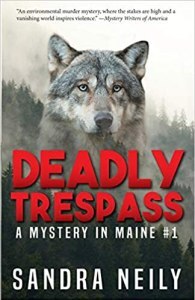 Find her novels at all Shermans Books (Maine) and on Amazon. Find more info on Sandy’s website.
Find her novels at all Shermans Books (Maine) and on Amazon. Find more info on Sandy’s website.
May 16, 2023
The Exploding Colors of Spring
Kate Flora: We are all seeing it, aren’t we, the way the natural world changes every day now. One gray and gloomy day, it will seem like the buds on trees that line the highway will never become leaves and a few days later, the landscape has exploded into a zillion shades of green interspersed with bits of red. It is the gardening season. It is the bug season. It is the season when the days are suddenly long and we still cannot get enough done.
now. One gray and gloomy day, it will seem like the buds on trees that line the highway will never become leaves and a few days later, the landscape has exploded into a zillion shades of green interspersed with bits of red. It is the gardening season. It is the bug season. It is the season when the days are suddenly long and we still cannot get enough done.
I am a hereditary gardener. My paternal grandmother had three long swaths of perennial beds in her lawn, with a white garden seat in the center whose lattice supported climbing roses. My father had a degree from the Stockbridge School of Agriculture. He along with my little sister Sara, had the kind of gardening touch where it seemed as though they could stretch out their hands and the plants would leap to them like animals wanting to be petted.
My parents were very competitive about gardening. For years, she kept her yearning to garden under wraps so as not to threaten him. Eventually, though, she couldn’t keep her desire for a garden of her own in check and established a garden outside the back door. He grew more traditional things in a more conventional way—though I do remember the truck being filled with softball-sized watermelons one year, and an abundance of cantaloupe. She practiced raised beds with heavily mulched paths and the beds were encircled with marigolds to deter pests. She grew bright purple beans that, disappointingly, turned green when they were cooked. The purple made them easy to harvest.

Dr. Who presides over my gardening efforts. Maybe he helps?
In the hilltop farm, spring meant all the counters, desktops, windowsills, and part of the floor would be covered with plants being raised from seed. Summer meant long evenings spent at the table after dinner, processing produce for canning and freezing, an activity that connected us to earlier times, when processing food was the only way people ate in the winter. Fall meant that pails of squash, potatoes, and onions were stored in the cement or dirt-floored cellar for the winter. The floor of the summer kitchen would hold squash and any tomatoes that could be rescued from the frost. Come January it would all begin again.
I inherited their passion though not, alas, their ability. I like to joke that I have a brown thumb and a credit card. It doesn’t mean that I don’t try, though. Right now, although I have a lot of writing and organizing on my plate, I cannot stay inside at the computer. In my earlier, more disciplined (or compulsive) years, I used to make a bargain with myself: an hour of gardening in the cool of early morning, and then back to work. Lately, I’ve been allowing myself more time in the garden. Partly, because I’m slower now. Partly because I want to be out there in the midst of the plant explosion.
This week, we were away for a few days and it seems like everything doubled in size. Those “empty” spaces in the garden I was wondering how to fill? They’re gone. The Japanese maple has grown huge. The golden spirea is a bold splash of yellow. The ligularia are threatening to take over the world. My painter’s palette persicaria are jumping out from the sea of green. I know I should be inside doing my homework, but as I embrace my 74th spring, the voice in my head asks: What Matters? What are you waiting for? And What will you regret? These messages say: Be outside now, when the world is impossibly alive. And I listen.
“empty” spaces in the garden I was wondering how to fill? They’re gone. The Japanese maple has grown huge. The golden spirea is a bold splash of yellow. The ligularia are threatening to take over the world. My painter’s palette persicaria are jumping out from the sea of green. I know I should be inside doing my homework, but as I embrace my 74th spring, the voice in my head asks: What Matters? What are you waiting for? And What will you regret? These messages say: Be outside now, when the world is impossibly alive. And I listen.




May 14, 2023
Your Heirs Will Thank You
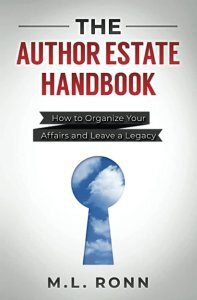 Kaitlyn Dunnett/Kathy Lynn Emerson here. I’ve just read one of the scariest books I’ve come across in a long time. The title is The Author Estate Handbook by M. L. Ronn and it lays out all the ways a professional novelist can screw up when it comes to the copyrights and other literary assets he or she leaves behind.
Kaitlyn Dunnett/Kathy Lynn Emerson here. I’ve just read one of the scariest books I’ve come across in a long time. The title is The Author Estate Handbook by M. L. Ronn and it lays out all the ways a professional novelist can screw up when it comes to the copyrights and other literary assets he or she leaves behind.
I thought I had this whole legacy thing pretty well in hand. I keep good records. During Covid, I organized even more and self-published all the unsold manuscripts traditional publishers didn’t want to buy. My will, although it was written quite a few years ago, specifies who gets what and deals with the issue of a literary executor.
It turns out that I haven’t even scratched the surface of what needs to be done before I croak.
For one thing I need to find an attorney who not only specializes in estate planning but also in intellectual property and copyright law. First, though, I appear to have a lot more organizing to do.
I already have electronic files (and printouts) of what I call manuscript histories, and I have lists of my publications with descriptions of the plots. Those files include a lot of information, but apparently not enough. Without me to translate and tell my future literary executor where to look for more details, there could be problems. So, I need to sit down and add, at least for the books I’ve self published or reissued, things like ISBN numbers, production information—cover designer, editor, and the like—and format-specific metadata like paperback trim sizes. I also need to include links to each book at all retailers (or in my case, to the two companies I use, Belgrave House and Draft2Digital, to handle distribution to retailers).
 My book manuscript files need to be better organized so that it is easy to find the version of each book that is actually current, especially since it may not be the one that originally appeared in print. I can’t forget short stories and other writing, either. I think I’m glad I never made any videos to post on the Internet. They would apparently be part of my estate, too, and would be likely to disappear after my death, as the wonderful “Signing in the Waldenbooks” with the late Parnell Hall already has.
My book manuscript files need to be better organized so that it is easy to find the version of each book that is actually current, especially since it may not be the one that originally appeared in print. I can’t forget short stories and other writing, either. I think I’m glad I never made any videos to post on the Internet. They would apparently be part of my estate, too, and would be likely to disappear after my death, as the wonderful “Signing in the Waldenbooks” with the late Parnell Hall already has.
I have a ton of reversion letters as well as current contracts. I need to make sure my literary executor knows where to find them and what to do with them in the future. More important still, I need to find out what each and every entity I receive income from (agent, publisher, conduit to retailers, etc.) has in place as a policy when the recipient kicks the bucket. Assuring that income goes where I want it to after I’m gone isn’t just a matter of making a will and it would be even more complicated if I dealt directly with a retailer like, say, Amazon. If you do, beware!
 I’ve been consolidating my domains into just one, which still makes sense to me, but I need to be darn sure my literary executor knows to keep renewing that domain name and paying for hosting. If future readers can’t find me, there goes my legacy. Same goes for any social media. I don’t do much, but keeping my presence on Facebook, or creating a new one after I’m gone, couldn’t hurt.
I’ve been consolidating my domains into just one, which still makes sense to me, but I need to be darn sure my literary executor knows to keep renewing that domain name and paying for hosting. If future readers can’t find me, there goes my legacy. Same goes for any social media. I don’t do much, but keeping my presence on Facebook, or creating a new one after I’m gone, couldn’t hurt.
Don’t even get me started on the importance of recording passwords so there will be access to what I leave behind. According to The Author Estate Handbook, it is possible that if there is no way to get at an account, money can keep going in and never come out. If your heirs can’t access it, they lose it. Ouch! The author singles out several other “silver bullets of doom” that can really screw up an inheritance. Fortunately, he also suggests the best ways to avoid them.
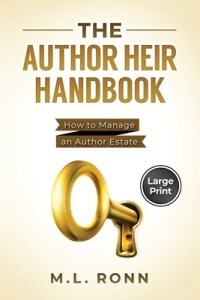 There are many helpful tips in this 210 page book. I fully intend to follow all those that apply to me, although I have to admit that knowing how much work that will involve has given me a bad case of procrastination. Nevertheless, I strongly advise every published writer to buy a copy of The Author Estate Handbook for themselves. If our literary legacies aren’t preserved after we die, what was the point of writing all those books in the first place?
There are many helpful tips in this 210 page book. I fully intend to follow all those that apply to me, although I have to admit that knowing how much work that will involve has given me a bad case of procrastination. Nevertheless, I strongly advise every published writer to buy a copy of The Author Estate Handbook for themselves. If our literary legacies aren’t preserved after we die, what was the point of writing all those books in the first place?
P.S. As backup, you might also want to buy M. L. Ronn’s The Author Heir Handbook.
Kathy Lynn Emerson/Kaitlyn Dunnett has had sixty-four books traditionally published and has self published others, including several children’s books. She won the Agatha Award and was an Anthony and Macavity finalist for best mystery nonfiction of 2008 for How to Write Killer Historical Mysteries and was an Agatha Award finalist in 2015 in the best mystery short story category. She was the Malice Domestic Guest of Honor in 2014. Her most recent publications are The Valentine Veilleux Mysteries (a collection of three short stories and a novella, written as Kaitlyn) and I Kill People for a Living: A Collection of Essays by a Writer of Cozy Mysteries (written as Kathy). She maintains websites at www.KaitlynDunnett.com and www.KathyLynnEmerson.com.
May 12, 2023
Weekend Update: May 13-14, 2023
 Next week at Maine Crime Writers there will be posts by Kaitlyn Dunnett/Kathy Lynn Emerson (Monday), Kate Flora (Tuesday), Sandra Neily (Thursday), and Dick Cass (Friday).
Next week at Maine Crime Writers there will be posts by Kaitlyn Dunnett/Kathy Lynn Emerson (Monday), Kate Flora (Tuesday), Sandra Neily (Thursday), and Dick Cass (Friday).
In the news department, here’s what’s happening with some of us who blog regularly at Maine Crime Writers:
Coming soon (June 9-10): Maine Crime Wave! Lots of Maine Crime Writers will be there. Registration is now open. For more information, click here:
https://www.mainewriters.org/maine-crime-wave
An invitation to readers of this blog: Do you have news relating to Maine, Crime, or Writing? We’d love to hear from you. Just comment below to share.
And a reminder: If your library, school, or organization is looking for a speaker, we are often available to talk about the writing process, research, where we get our ideas, and other mysteries of the business, along with the very popular “Making a Mystery” with audience participation, and “Casting Call: How We Staff Our Mysteries.” We also do programs on Zoom. Contact Kate Flora
Lea Wait's Blog
- Lea Wait's profile
- 509 followers



